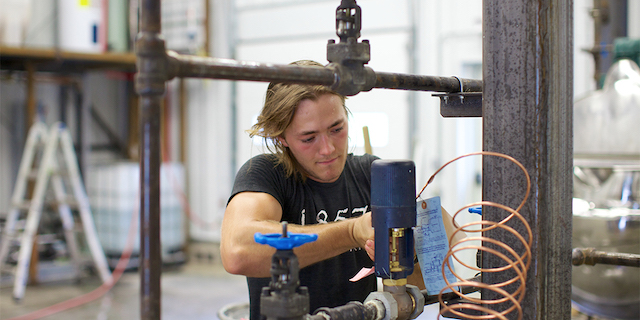Elias Barber had to do something with all of the potatoes going to waste on his family’s farm — the ones that wouldn’t meet a consumer’s expectations for how a potato should look. The sixth generation farmer knew that ugly potatoes just don’t sell, no matter how they taste. In time, the answer was obvious: make vodka.
1857 Spirits, the potato vodka that is the first spirit to come from the family farm, just became available to the public — after an effort that was, on some level, centuries in the making.
For more than 150 years, the Barbers have been dwelling and cultivating in the fertile Schoharie Valley of upstate New York. Barber’s Farm has had many incarnations, as a dairy farm, growing alfalfa, harvesting grains, but they now produce over 100 varieties of crops for retail.
The valley is a geographic anomaly, about half a mile wide, with some of the best soil to be found in the country. During the American Revolution, the Schoharie Valley was nicknamed “the breadbasket,” because it supplied Washington’s army with all of their wheat and grain.
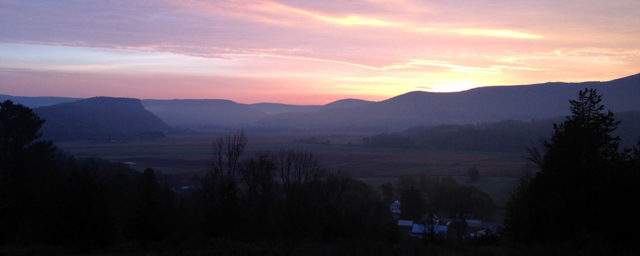 For more than 150 years, the Barbers have been dwelling and cultivating in the fertile Schoharie Valley of upstate New York. It’s about half a mile wide, with some of the best soil to be found in the country. Photos courtesy of 1857 Spirits.
For more than 150 years, the Barbers have been dwelling and cultivating in the fertile Schoharie Valley of upstate New York. It’s about half a mile wide, with some of the best soil to be found in the country. Photos courtesy of 1857 Spirits.
“It was one of the few places that the farmers were selling their crops to the colonists rather than the Tories,” Barber says. It’s a source of pride and something of a raison d’être for the whole family.
Barber grew up loving life on the farm, and even when he left for college at Cornell, he knew he would return.
“I was always drawn to the farm, drawn to the challenge of farming. I thought it was the most complicated thing in the world, because it’s what I knew the most about,” he says. “I knew I wanted to be on the farm. What role I would play? I had no idea.”
He pursued a degree in plant biology, expanding from a scientific perspective what he already knew. It was natural.
While Barber was in school, his Aunt Dorcas kept floating the idea of making potato vodka, an idea that had been casually discussed at the family table for years. Finally, she headed out West to take a class on distilling, and she convinced Barber to go with her. They ventured to Grand Teton Distillery in Driggs, Idaho.
“We went out, we learned a little bit, and at the end, we looked at each other and said ‘let’s do it.’”
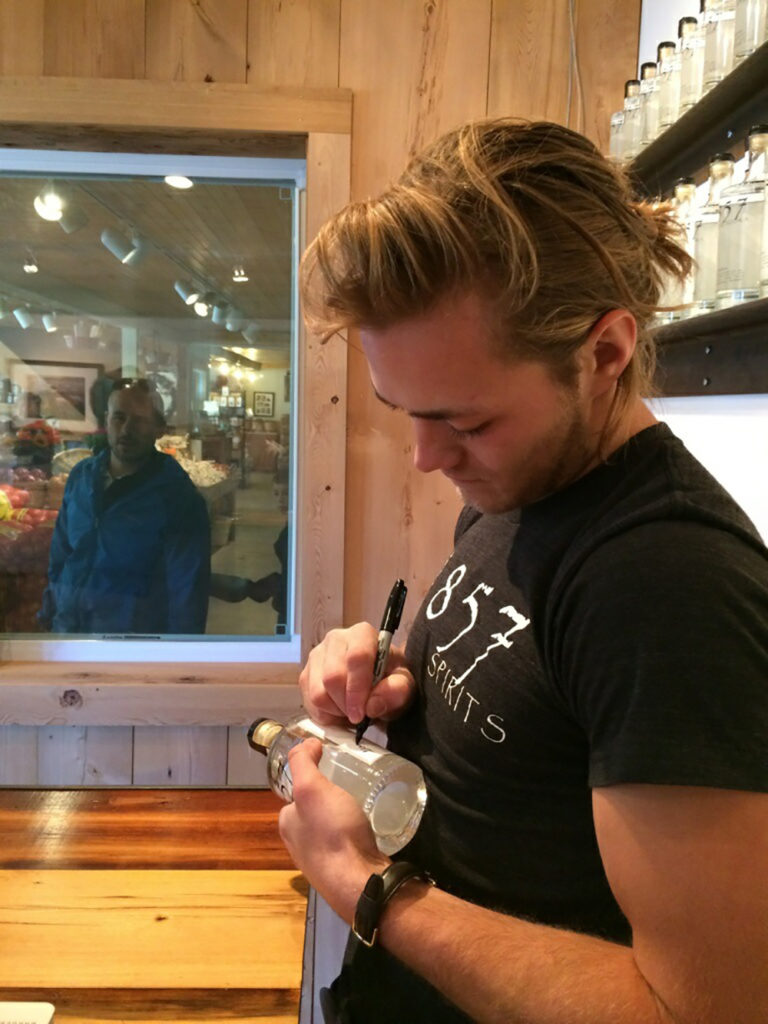 After deepening his knowledge of agriculture at Cornell, Elias Barber set out to learn about distilling. After a long course of self-appointed study and experimenting, he’s releasing his first product — potato vodka.
After deepening his knowledge of agriculture at Cornell, Elias Barber set out to learn about distilling. After a long course of self-appointed study and experimenting, he’s releasing his first product — potato vodka.
Barber was out of school and ready to commit to learning the craft. With all he knew about farming and plant biology in tow, he began a month-long apprenticeship at Grand Teton. After that, he hit the books.
“I studied it for a year before even trying to make things,” Barber says. “It was the biggest research project of my life.”
He visited more distilleries; he asked questions. He returned to Cornell to research, experiment with and select a potato variety that would be most conducive to the high quality potato product he imagined. (Although he continues to experiment with the table stock varieties grown on Barber’s Farm.)
Through trial and error (and sage advice from other distilleries), Barber was soon distilling.
“I was pretty lucky to produce a really wonderful product early on in the development,” he says, “and there’s still a lot of tweaking going on, but that will probably never stop.”
After all the tasting he’s done, he can smell a batch to know whether it’s turned out.
The Barber family is increasingly involved in Elias’s efforts. His brother, who works for the USDA, has pushed forward the licensing. His Aunt Dorcas and Uncle Larry are at the helm of business and marketing efforts. And with all efforts involved, they’re seeing quick success.
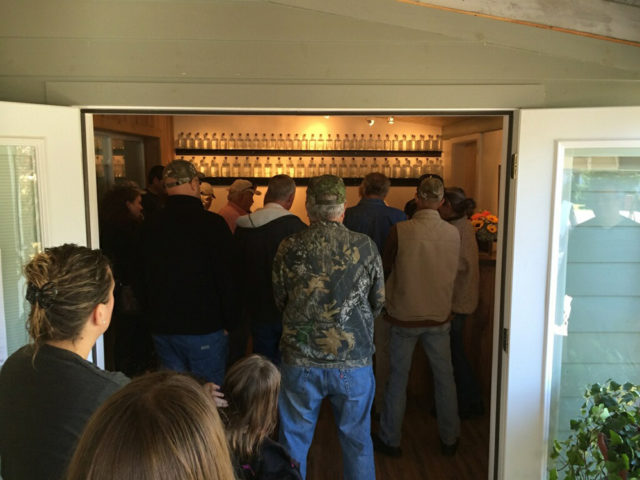 Supportive neighbors lined up for the first release of 1857 Vodka, and as word gets out, people are coming back by the masses to buy the stuff in bulk.
Supportive neighbors lined up for the first release of 1857 Vodka, and as word gets out, people are coming back by the masses to buy the stuff in bulk.
Barber describes his vodka as particularly sip-able, something that the spirit (so often subdued by sugary juice or soda) is not widely known for. It’s the kind of spirit you hold in your mouth for a moment, enjoying its fine balance between smooth and complex, rather than something to knock back hastily from a plastic cup. Try it neat or on the rocks, he suggests; consume it more like a good bourbon or Scotch.
As 1857 Spirits is newly making its way into the hands and glasses of consumers, Barber is not tempted to stop with one quality product. He’s hopes to find out quickly what else he can do.
Like any good farmer, Barber knows that in order to secure future growth, he must remain committed to sustainability. All of his waste (the spent mash, the potato remains that go unused in distillation) are composted and put right back into the soil from which they grew. The water he uses (an essential quality component in the case of vodka) comes from a spring bubbling up out of the ground right behind the distillery. Alongside his newly hired assistant, Emily Driscoll, he hand-harvests and washes each potato. For 1857 Spirits, “local” takes on a whole new meaning.
“Some distilleries claim that they grow their own potatoes, but the difference is I’m standing outside our distillery and I can see our potato field about 300 yards,” he says. “It’s pretty intimate.” Right now, five of the family’s 500 acres are dedicated to growing potatoes for distilling.
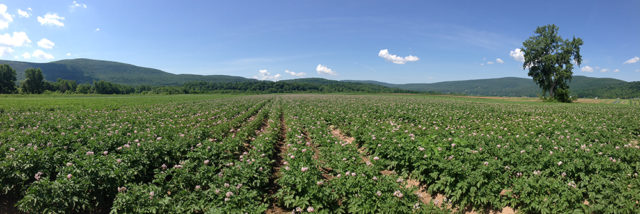 1857 Vodka gives a whole new meaning to local — potatoes are grown and hand-harvested on the same farm property, where distiller Elias Barber also lives.
1857 Vodka gives a whole new meaning to local — potatoes are grown and hand-harvested on the same farm property, where distiller Elias Barber also lives.
For Barber, this proximity is 24/7 — he also lives on the farm, in a 200-year-old house about 100 feet away from the distillery. Residing next door to his workplace leads to a lot of crossover between profession and play. On one hand, his work never ends. On the other, it didn’t feel like work to begin with. For Barber, that was always the appeal.
“It’s got to be what you love to do. There’s really no separation in work and pleasure —it’s a lifestyle more than a profession; that’s why I loved it.”
There can be no question, no yearning for freetime or other priorities when distilling calls. He likens it in that sense to milking cows. Much like bovines that demand to be milked when the milk is ready, “It’s a living thing you’re dealing with — the yeast and fermentation, you can’t just walk away from it.”
Barber’s ceaseless dedication is paying off. He began selling bottles of the 1857 Vodka at the family farmstand this fall, and already he’s developed a loyal local customer base. At first, neighbors came forth just to show their support, but after experiencing a quality of vodka they’d never had before, they came back for the larger 750-mL bottle for themselves and a case to distribute as holiday gifts. The crowd of fans grow each week. Aunt Dorcas and Uncle Larry are hard at work getting the vodka sold in bars and bottle shops in New York City. “It’s been quite an easy sale,” he says. “Really all they have to do is get a glass in front of the manager and there’s been no resistance yet.”
His brand is just beginning to blossom, but Barber has already come a long way.
“I grew up picking potatoes since I was 11-years-old or so for a quarter a bushel, so I’m quite pleased to be on this side of it now.”
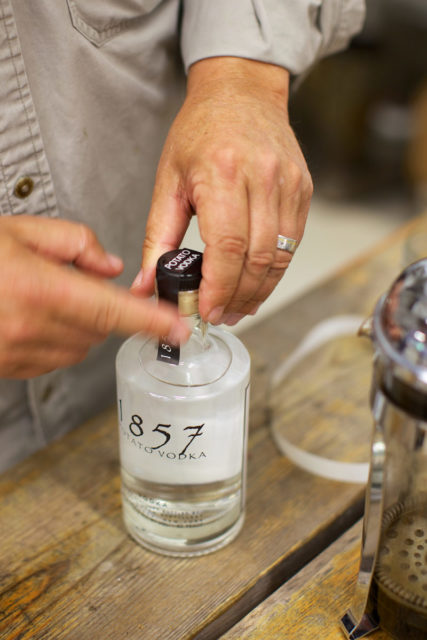 Uncle Larry Friedberg bottles the spirit his nephew distilled.
Uncle Larry Friedberg bottles the spirit his nephew distilled.


